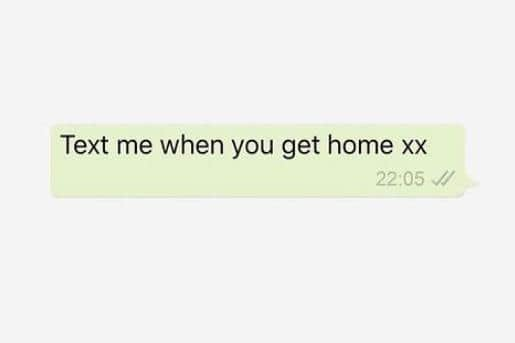Text me when you get home: meaning of Instagram message that went viral following Sarah Everard disappearance
Sarah Everard’s disappearance has led to a worldwide social media movement about women’s safety.
Since the 33-year-old marketing executive went missing in south London last Wednesday (3 March) while walking home, many women have shared their personal stories about feeling scared and unsafe when alone.
Advertisement
Hide AdAdvertisement
Hide AdOne post on the subject has gone viral on Instagram - the simple image of a message reading “text me when you get home”.
More than a million people have liked, shared and commented on the picture, which was uploaded by influencer Lucy Mountain.
This is what the text message means and why the post has gone viral as women share their stories.
What does ‘text me when you get home’ mean?


Following Sarah Everard’s disappearance, many women posted infographics, quotes and pictures to their Instagram stories about feeling unsafe in public.
A post that gained a lot of attention Lucy Mountain’s, a personal trainer and lifestyle blogger from England with over 400,000 followers.
The image, uploaded on Thursday 11 March, shows a green WhatsApp message on a white background simply reading “text me when you get home xx”.
Many women reposted the image to their story to send a simple message about the Sarah Everard case.


In the post’s caption, Lucy explained why she chose to post that picture of a text message.
Advertisement
Hide AdAdvertisement
Hide Ad“I don’t even know how to word this because I feel like my words can’t do justice to how many women are feeling right now,” she wrote.
“I’ve had conversations about how being hyper-conscious of our safety is just something we’ve done throughout our entire lives. The deep sense of connection is one of fear.” ⠀
She went on to give specific examples of the precautions women take when walking home on their own - from sharing their location with friends to thinking about possible escape routes.
Lucy said: “What’s so insidious is that these things don’t even feel like ‘special safety tools’.
“They’re literally just engrained behaviours and actions we’ve had to pick up since we were little girls. Because ’that’s just the way it is’.”
The influencer went on to focus on how the “text me when you get home” message is a common, auto-pilot procedure carried out by women around the world to ensure their friends and family return to where they live safely.
She pointed out that she wished more men understood that women are scared when they get in Ubers, walk home or walk past groups of men.
”Stop harassing women. Stop victim-blaming women. And stop burdening women with the weight of other men’s actions,” the caption finished.
Advertisement
Hide AdAdvertisement
Hide AdInstagram users have been praising the blogger for summing up the everyday fears women experience, and the measures they have to carry out, when it comes to going anywhere alone.
Why are women sharing their experiences of feeling unsafe?
Sarah Everard’s case has sparked outrage and sadness across social media.
Relating to her disappearance, women have revealed their own experiences of sexual assault, violence or simply feeling unsafe when walking past men in public.
Many have noted how Ms Everard followed “all the rules” - the everyday precautions women take to get home safely.
Political correspondent at Sky News, Kate McCann, wrote that what happened to the young woman “hit home hard” for so many “because we make the calculations she did every day too”.
“We take the longer, better-lit route, push the fear aside for the voice that says ‘don't be daft, you've every right to walk home alone at night and be safe’,” she wrote in a Tweet.
McCann went on to explain that women always say “I’ll text when I’m back” while making a plan for getting home safely.
First Minister Nicola Sturgeon retweeted the journalist’s post, adding that there would be few, “if any”, women who would not identify with feeling scared while out alone.
Advertisement
Hide AdAdvertisement
Hide AdAnother user added: "Sarah Everard kept to all the 'rules' that society has set out for women to stay safe and she still wasn't able to walk home safely. We need to stop blaming the victim."
Many posts acknowledged this unwritten protocol that all women follow at night, summarising the different tactics including holding keys between fingers, taking earphones out, calling a male partner, looking over the shoulder and keeping a good pace.
"Every woman you know has taken a longer route," wrote Doughty Street barrister Harriet Johnson.
"[Every woman] has doubled back on herself. Has pretended to dawdle by a shop window. Has held her keys in her hand. Has made a fake phone call. Has rounded a corner and run.
"Every woman you know has walked home scared. Every woman you know."
MPs listened in silence on Thursday 11 March as Labour MP Jess Phillips read out the names of nearly 120 women killed in the UK where a man has been charged or convicted as the primary perpetrator.
What can I do if I’m concerned about my safety?
Thousands of women have shared ways people can ask for help if they are feeling concerned about their safety.
As well as the Emergency SOS iPhone function which can discreetly alert emergency services and contacts of your whereabouts, there is:
Signal for Help
Advertisement
Hide AdAdvertisement
Hide AdThe “Signal for Help” hand gesture, launched during the pandemic last year to address the rise in domestic violence during lockdown, was developed to alert family, friends or colleagues that you need help.
Created by the Women's Funding Network and the Canadian Women's Foundation, it involves putting your palm up, tucking your thumb in and closing your fingers.
No verbal interaction is needed, meaning it can be used discreetly.
ANI
Similarly, in January it was announced that pharmacies were launching the ANI codeword scheme to help domestic abuse victims during restrictions.
In Boots stores and private pharmacies, if a victim asks for ANI (meaning “action needed immediately”) a trained worker will take them aside to get help from domestic abuse services or the police.
Ask for Angela
The scheme echoes the Ask for Angela initiative that was launched in hospitality venues in 2016.
Designed to prevent sexual violence, posters in venues inform customers that they are able to “ask for Angela” to a member of staff.
The discreet code word instructs employees that the victim feels unsafe or threatened and help can then be arranged.